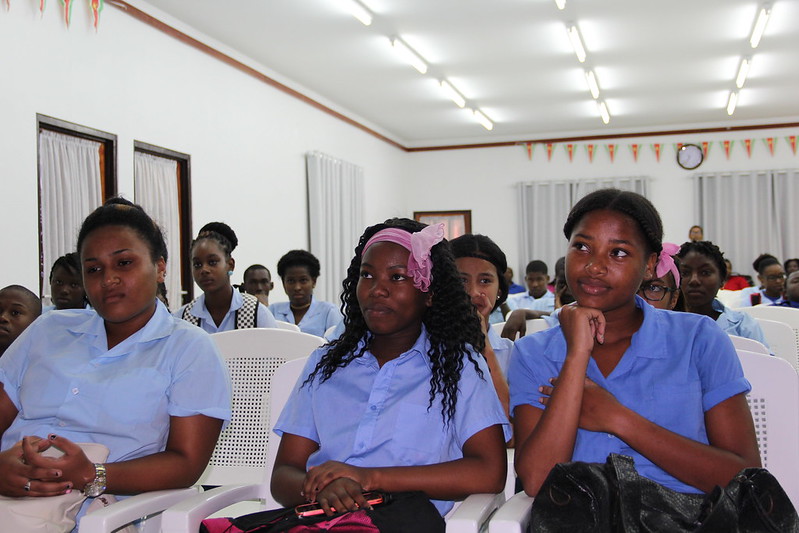Women’s Rights in Suriname
 Article 35 of the Surinamese Constitution states that men and women are equal before the law. Recent studies indicate that 13.6% of women and 14% of men live below the international poverty line, showing fairly equal levels of poverty among both genders in Suriname. However, these numbers fail to capture the economic disparities that women face due to unpaid labor, health risks and social roles. Suriname’s coastal location makes it severely prone to flooding, and this is one contributor to women’s disadvantageous position in society. Women’s traditional role in society, unique health risks and limited participation in decision-making disproportionately impact women during flooding and increase poverty rates among Surinamese women.
Article 35 of the Surinamese Constitution states that men and women are equal before the law. Recent studies indicate that 13.6% of women and 14% of men live below the international poverty line, showing fairly equal levels of poverty among both genders in Suriname. However, these numbers fail to capture the economic disparities that women face due to unpaid labor, health risks and social roles. Suriname’s coastal location makes it severely prone to flooding, and this is one contributor to women’s disadvantageous position in society. Women’s traditional role in society, unique health risks and limited participation in decision-making disproportionately impact women during flooding and increase poverty rates among Surinamese women.
Traditional Role of Women
In Suriname, gender roles are clearly defined, and women are responsible for household chores or raising children. Because they spend so much of their time doing unpaid work, they have fewer opportunities to seek paid employment. This financial dependency on the men in the household reinforces women’s lower position in society. Additionally, cultural practices in Suriname restrict women’s freedom of movement, meaning males must accompany them if they walk outside their homes or villages. Moreover, flooding exacerbates this issue because infrastructure damage makes travel difficult. This limited mobility hinders women from finding employment or education, making the traditional role of women a primary reason why women face higher rates of poverty than men, according to the 2023 Gender and Disaster Risk Management (DRM) report.
Health Risks
Flooding results in contaminated water, which disproportionately affects women because they use this water while doing household chores. This increased exposure heightens their chance of contracting waterborne illnesses, according to the 2023 DRM report. When floods compromise women’s health, they cannot fully participate in society or pursue higher education or employment. This perpetuates the cycle of inequality because women suffering from poor health are less productive and will be more likely to remain in poverty.
Limited Participation and Decision Making
In Suriname, women hold only 29.4% of seats in national parliament. The average percentage of women in parliament in the LAC is 32.8%, so Suriname is slightly lower than the regional average, according to the 2023 DRM report. Because women in Suriname have limited representation in decision-making about disaster management or response efforts, policymakers overlook women’s needs during a flood. Even if women want to participate in decision-making, societal expectations and systemic discrimination create barriers for them. Lack of input from women in decision-making causes important issues like equal pay or maternity leave to not be prioritized, which hinders women’s economic opportunities and increases the risk of poverty.
Ilse Henar Foundation for Women’s Rights
Flooding in Suriname has enlarged the gender poverty gap, and the Ilse Henar Foundation for Women’s Rights is working to correct this. Founded in 1996 to commemorate the 15th anniversary of the National Women’s Movement, this NGO aims to protect the rights of women, establish non-discrimination policies in Surinamese law and alleviate poverty for all. One of its most notable accomplishments was helping draft legislation to eliminate sexual harassment in workplaces in Suriname. By focusing on women’s rights, the Ilse Henar Foundation is ensuring that women have legal protection from harassment or discrimination, creating a safer work environment. This incentivizes women to seek employment, lifting them out of poverty.
Conclusion
Flooding in Suriname exacerbates the challenges faced by women, highlighting the urgent need to address gender disparities. Empowering women in disaster management is crucial because their inclusion in decision-making ensures that their needs are translated into policies. The Ilse Henar Foundation for Women’s Rights does exactly that, advocating for women’s rights in Suriname and ensuring their equal participation in decision-making processes. These actions foster an environment where women in Suriname can thrive economically because they are more willing to join a workforce that is free of harassment and discrimination.
– Sophia Manole
Sophia is based Bellevue, WA, USA and focuses on Good News for The Borgen Project.
Photo: Flickr
